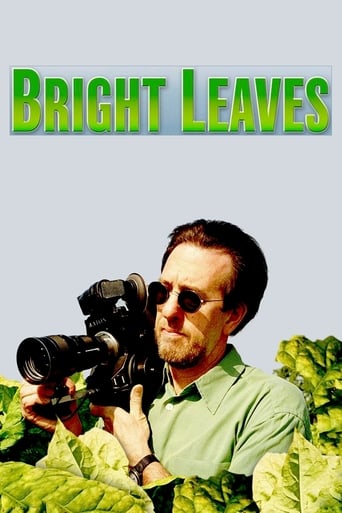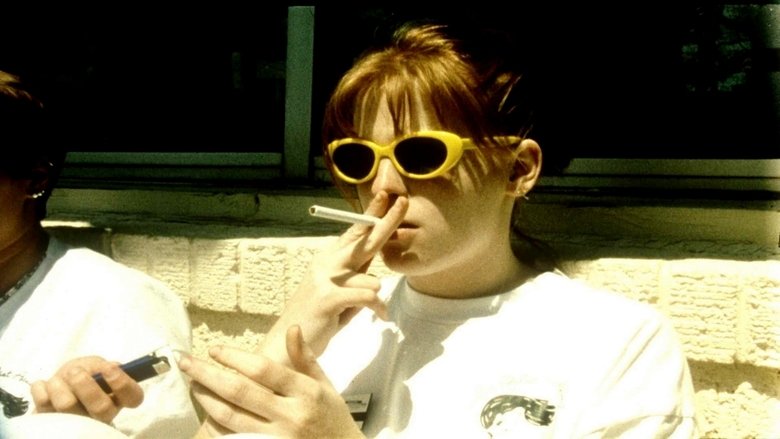
Ross McElwee travels through the North Carolina tobacco belt in search of the ancient southern traditions associated with tobacco growing and use, while comparing his filmmaking to commercial cinema, represented by Bright Leaf, a melodrama directed by Michael Curtiz in 1950, starring Gary Cooper, apparently based on the life of his great-grandfather.
Reviews
The film creates a perfect balance between action and depth of basic needs, in the midst of an infertile atmosphere.
This is a small, humorous movie in some ways, but it has a huge heart. What a nice experience.
While it is a pity that the story wasn't told with more visual finesse, this is trivial compared to our real-world problems. It takes a good movie to put that into perspective.
By the time the dramatic fireworks start popping off, each one feels earned.
McElwee's witty and poignant voice-over makes this a beautiful piece about his family's history and the tobacco culture of North Carolina. I'm not quite sure what the previous reviewer is talking about. McElwee carefully and tastefully interviews his subjects and it is clear that he is not in any way being contemptuous or mocking them, rather it seems that the people he interviews are very much like he -- from the same place and background, and in my humble opinion, he shows them in a very sympathetic light. If you can find this film, you should definitely watch it. I have to admit that I am biased because I love his documentaries. If you like any of his films, you'll enjoy this one.
It was about 15 years ago that I first saw Ross McElwee's quasi-autobiographical documentary about his quest to trace General Sherman's unsuccessful campaign through the South during the Civil War. "Sherman's March" was a film which showed the delightful disconnect between McElwee's memories of vestigial Southern culture, with the man he had become. Just as the American South exemplifies the Sublime to the Ridiculous, McElwee's ostensible journey to follow the trail of Sherman's March was really an excuse to visit old girlfriends and childhood memories along the way."Bright Leaves" is so good a follow up to McElwee's earlier film about his search to understand his Southern roots that, rather than inviting a comparison with "Sherman's March," it simply picks up his story with a new quest. This time it's his search to understand the history of North Carolina tobacco farming, which was also a part of his family's history three generations before.The film is at least two hours long, but not one extraneous frame is included. In McElwee's typical style, he presents us with a meandering, quiet, thoughtful and extremely funny unfolding of the tobacco story, and his signature pacing perfectly highlights the layers and layers of meaning he wants to get across.As a Northerner and unashamed Yankee who has lived in the South for 13 years (which is 12 years too long), I can vouch that McElwee's films have just as much value for those of us who lack the DNA required to understand the South. His films are not just for born and bred Southerners who see themselves as special members of a unique and proudly eccentric group.On a practical level, "Bright Leaves" may be the best anti-smoking film ever made, just as "Supersize Me" was the most convincing argument about the dangers of fast food. I highly recommend you take your kids to see it, too.
It's deceptive to say what the movie's "about", although you might sum it up something like "a meditation on the metaphorical connections between the dangers and allure of smoking and the dangers and allure of documentary film-making". Though that's not quite it. McElwee's film is best experienced, rather than talked about, as the delights are in the details: Patricia Neal advising a fan on how to use her camera; McElwee park, a rather sad looking field with a couple of benches (McElwee actually sits in one, a rare moment when he's on screen himself); footage of McElwee's father in a yamaka, while McElwee wonders aloud why his dad, a staunch Presbyterian, was wearing a yamaka; a couple that keeps vowing to quit smoking and keeps breaking the vow. Etc. The movie rambles about, sometimes with only a very vague connection to the ostensible theme of "tobacco in the South", but that's it's charm -- it's like a filmic version of literary miscellany. Highly recommended.
Seen at NYFF. Ross McElwee has perfected a sui generis form of personal-confession, free-associating, voiced-over "documentary" (if that's the word) that isn't quite like anything else. (Comparisons will doubtless be made with Michael Moore, but the difference is obvious: Moore hammers his points home, while McElwee tries to pretend that he doesn't have any to make.) Five years, he tells us, in the making, the film mines his native North Carolina for musings on tabacco, its ravages, its sweet consolations, and the fact that his family lost its fortunes to the Duke clan and then made back a more modest one by treating the victims of the industry that that clan had perfected. Oh, and that he had a father and has a son he whom he loved and loves beyond all telling. And that there was a Michael Curtiz/Gary Cooper movie, "Bright Leaf", that may or may not be about his family, but that we all ought to go check out anyway, if only to see Cooper interact on screen with his then lover Patricia Neal, who turns up in the now-doughty flesh the better to frustrate McElwee in his attempts to validate his romantic notions, another theme. North Carolina is the main character here, or rather McElwee's complex relationship with it and feelings about it and about his own now-Yankeeized family. Charm and yarns, poignant reflections on time lost and time regained and how the home movies he and his family seem to have made with Friedmanesque compulsion may or may not interact with these, some pure and wonderful comedy on film itself, all come together in a rich stew.If you expect movies to be "about" anything in particular, this film will doubtless leave you scratching your head in frustration and bafflement. If you can accept a movie that is a beautifully paced (quick/elegiac/quick) romp by a quirky mind with one of the sharpest eyes around, you'll have a great time. The festival audience (many of whom, unlike me, seemed to know what to expect) certainly did.PS: In the Q&A, McElwee pointed out the obvious: that this film was actually made on film, not from digitized pixels. He wryly dismissed those who applauded this affirmation as flacks for Kodak, but the reason for the applause is real and obvious. What a joy it is once again to actually see detail in an image, to see faces in full and changing expression instead of in soupy facsimile. And to see real colors (and what an eye for color McElwee has) in all their changing subtlety, instead of vague planes of yellow or puce.
Top Streaming Movies













